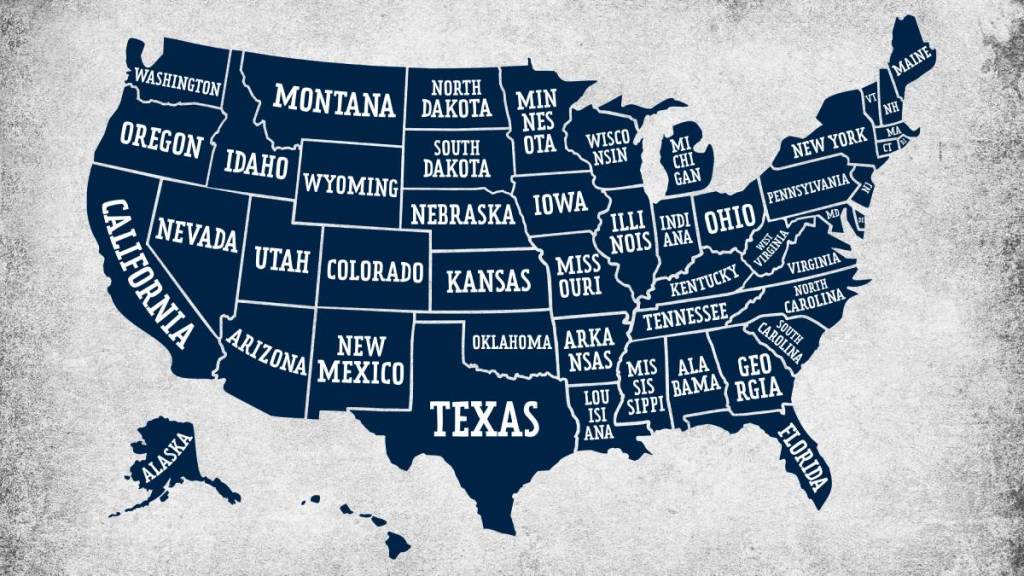You’re probably aware that each state has its own real estate license requirements, unique laws and regulations around real estate licensure. So, should you want or need to move to another state, does this doom you to a life of re-taking exams? Not necessarily, thanks to two key concepts of real estate licensure we’re breaking down for you in this article — real estate license reciprocity and real estate license portability.
Real estate license reciprocity means an agent or broker’s ability to get licensed and operate or practice in a new state, whereas real estate license portability refers to an agent or broker’s ability to conduct a single transaction across state lines. Portability is distinct from reciprocity in that it’s not a long-term solution, but rather, it enables an agent or broker to help a client outside of their own state of licensure (where permitted). Let’s dig into the specifics to help you better understand where you can practice and transact.
What is real estate license reciprocity?
Real estate license reciprocity allows agents licensed in one state to apply for a license in another state without taking all of the state-required prelicensing real estate courses, and in some cases, that state’s real estate licensing exam. Real estate license reciprocity varies by state. Some states do not have any reciprocity agreements at all.
We’ll break down the real estate license reciprocity and portability rules for each state below, but before we can do that, we have a few more terms to clarify for you.
Types of real estate license reciprocity
Depending on the state, agents may receive different levels of reciprocity with their real estate license. Generally, there are three types: Full reciprocity, partial or selective reciprocity and no reciprocity.
- Full Reciprocity: This means that a real estate agent licensed in any state can obtain a license in a full reciprocity state without having to retake the licensing exam or complete additional prelicensing education.
- Partial or Selective Reciprocity: A state with partial or selective reciprocity allows for the transfer of real estate licenses between specific states, often those with similar real estate laws and regulations.
- No Reciprocity: This is exactly what it sounds like. If you’re looking to practice in a state with no reciprocity, prepare to go through that state’s entire licensing process — from start to finish.
To illustrate, if you’re moving from California to New York, you’re out of luck, since California does not have reciprocity agreements with any other state. But if you’re planning a move to Colorado or Delaware from any other state in the nation, you’ll have a smooth transition, since both states offer full reciprocity with all other states.
What is real estate license portability?
Real estate license portability allows agents to work with clients in another state without being licensed there. Consider this more of a short-term solution. If you’re planning on regularly working in another state, don’t depend on this option. As with reciprocity, there are several classifications of portability.
Types of real estate license portability
As with license reciprocity, there are several classifications of portability.
- Cooperative: A state with cooperative portability allows real estate agents from another state to conduct business there, provided they partner in the transaction with an agent licensed in that state.
- Physical Location: A state with a physical location real estate license portability law allows agents to represent clients in out-of-state purchases or sales. But the agent must do it remotely. Agents can’t be located in the state in which they want to conduct business during the transaction.
- Turf: Turf states don’t allow any form of portability. Like no reciprocity states, you cannot work on any transactions if you don’t have a real estate license in their state.
To illustrate, if you have a client who wants to buy a vacation home on Maui or on Cape Cod, you can represent them in a transaction in either Hawaii or Massachusetts, since both states have license portability based on physical location (you can represent your client in those states as long as you’re licensed in your state and conducting business remotely).
Suppose that same client opts to purchase a vacation property on the Georgia coast instead. In that case, you’ll need to cooperate with a licensed Georgia agent and jointly represent your client in a property purchase in GA. If your client decides they want to buy a second home in Utah, instead, you’d need to refer them to a Utah licensed real estate professional who could represent them on the buy side, since Utah is a turf state.
Related articles
Real estate license reciprocity & portability: A state-by-state guide
So where can I work and conduct real estate transactions, you’re wondering? We’ll break it down for you state-by-state in this next section. Click on your state, below, to learn more about where easily move with your current real estate license — and in which states you can currently help clients beyond your state’s borders.
Alabama
Reciprocity: Full reciprocity. Agents will need to take a six-hour course and apply for an Alabama real estate license.
Portability: Cooperative
For more information, visit Alabama’s Real Estate Commission page.
Alaska
Reciprocity: None. To participate in real estate transactions in Alaska, you will need to go through the state’s entire licensing training and exam.
Portability: Physical Location
For more information, visit Alaska’s Real Estate Commission page.
Arizona
Reciprocity: It’s complicated. Arizona does not have formal reciprocity with other states, however, it does recognize out-of-state licenses, provided that the agent is an Arizona resident and has held an out-of-state license for at least one year. Agents will still need to pass a state-specific course and prove residency.
Portability: Cooperative
For more information, visit Arizona’s Department of Real Estate page.
Arkansas
Reciprocity: Partial. Arkansas has reciprocity with Alabama, Colorado, Florida, Georgia, Iowa, Kansas, Louisiana, Mississippi, Nebraska, Ohio, Oklahoma, Pennsylvania, South Dakota, Washington, and West Virginia.
Portability: Physical Location
For more information, visit Arkansas’ Real Estate Commission page.
California
Reciprocity: None. To obtain a license in California, out-of-state agents must go through the required steps, including passing a written exam.
Portability: Physical Location
For more information, visit California’s Department of Real Estate page.
Colorado
Reciprocity: Full reciprocity. Agents licensed in any state may practice in Colorado as long as they have been licensed for at least two years. They will need to pass the state portion of the Colorado Real Estate Broker’s Exam.
Portability: Cooperative
For more information, visit Colorado’s Division of Real Estate page.
Connecticut
Reciprocity: Partial. Connecticut has reciprocity with Alabama, Colorado, Florida, Georgia, Illinois, Indiana, Massachusetts, Mississippi, Nebraska, New York, Ohio, Oklahoma and Rhode Island. However, agents from Florida, Illinois, Indiana and Ohio are required to take the state portion of the Connecticut Real Estate Examination.
Portability: Cooperative
For more information, visit Connecticut’s Department of Consumer Protection page.
Delaware
Reciprocity: Full reciprocity. Agents from any state only need to submit an application and required paperwork.
Portability: Physical Location
For more information, visit Delaware’s Real Estate Commssion page.
Florida
Reciprocity: Partial. Florida has reciprocity with Alabama, Arkansas, Connecticut, Georgia, Illinois, Kentucky, Mississippi, Nebraska, Rhode Island and West Virginia. Agents will need to pass the state portion of the Florida Real Estate Exam.
Portability: Physical Location
For more information, visit Florida’s Department of Business and Professional Regulations page.
Georgia
Reciprocity: Full reciprocity. Agents from any state, with the exception of Florida, only need to submit an application and required paperwork. Florida applicants must pass a supplemental exam.
Portability: Cooperative
For more information, visit Georgia’s Real Estate Commission page.
Hawaii
Reciprocity: None. To obtain a license in Hawaii, out-of-state agents must go through the required steps, including passing the state’s real estate exam.
Portability: Physical Location
For more information, visit Hawaii’s Real Estate Branch page.
Idaho
Reciprocity: None, with a few caveats. Idaho does not have formal reciprocity with any state, but it waives the national portion of the licensing exam, and a few other item as applicable, if you are licensed on active status in another state.
Portability: Physical Location
For more information, visit Idaho’s Real Estate Commission page.
Illinois
Reciprocity: Partial. Illinois has recirprocity with Colorado, Connecticut, Florida, Georgia, Indiana, Iowa, Nebraska and Wisconsin. Agents from these states will still need to pass the Illinois portion of the licensure examination.
Portability: Physical Location
For more information, visit Illinois’ Department of Financial and Professional Regulation page.
Indiana
Reciprocity: None. To participate in real estate transactions in Indiana, you will need to go through the state’s entire licensing training and exam.
Portability: Cooperative
For more information, visit Indiana’s Real Estate Commission page.
Iowa
Reciprocity: Partial. Iowa has reciprocity with Arkansas, Georgia, Louisiana, Massachusetts, Minnesota, Mississippi, and North Dakota. Even if you are not licensed in one of those states, you can still apply to have the national portion of the exam waived.
Portability: Physical Location
For more information, visit Iowa’s Professional Licensing Bureau page.
Kansas
Reciprocity: None. To participate in real estate transactions in Kansas, you will need to go through the state’s entire licensing training and exam.
Portability: Cooperative
For more information, visit Kansas’ Real Estate Commission page.
Kentucky
Reciprocity: Partial. Kentucky has has reciprocity agreements with Florida, Illinois, Ohio, Tennessee and West Virginia. The reciprocity requirements vary for each of these states and includes a 40-hour reciprocal license law course for all.
Portability: Turf
For more information, visit Kentucky’s Real Estate Commission page.
Louisiana
Reciprocity: Partial. Louisiana has reciprocity agreements with Alabama, Arkansas, Colorado, Georgia, Iowa, Mississippi, New Mexico, Oklahoma and Pennsylvania. No additional training or exams are required.
Portability: Cooperative
For more information, visit Louisiana’s Real Estate Commission’s page.
Maine
Reciprocity: It’s complicated. Out-of-state agents from any state may apply for a license, but everyone is required to take the full licensing exam for the State of Maine. While no pre-licensing training is listed as a requirement, we certainly recommend it in advance of the exam. Heads up: A non-resident licensee must be affiliated with a Maine licensed real estate agency to be eligible to perform brokerage services.
Portability: Physical Location
For more information, visit Maine’s Real Estate Commission page.
Maryland
Reciprocity: Partial. Maryland has reciprocity with Oklahoma and Pennsylvania. Maryland does things a bit differently, offering out-of-state license recognition for applicants from all other states. Agents’ education and experience are reviewed for transferability, individually for each applicant.
Portability: Cooperative
For more information, visit Maryland’s Department of Labor page.
Massachusetts
Reciprocity: Partial. Massachusetts has reciprocity with Connecticut, Rhode Island, West Virginia, Nebraska, Iowa, Tennessee, Mississippi, Colorado, Georgia, Pennsylvania and New Mexico. Additionally, brokers licensed for two years from New York and Oklahoma may also receive reciprocity.
Portability: Physical Location
For more information, visit Massachusetts’ Board of Registration of Real Estate page.
Michigan
Reciprocity: None. To participate in real estate transactions in Michigan, you will need to go through the state’s entire licensing training and exam.
Portability: Physical Location
For more information, visit Michigan’s Department of Licensing and Regulatory Affairs page.
Minnesota
Reciprocity: Partial. Minnesota has reciprocity agreements with Colorado, Iowa, Nebraska, North Dakota, South Dakota and Oklahoma. Agents must contact a Minnesota-licensed primary broker in order to submit an application. No additional training or exams are required.
Portability: Physical Location
For more information, visit Minnesota’s Commerce Department page.
Mississippi
Reciprocity: It’s complicated. Mississippi does not have formal reciprocity with any state, but it does have an application for non-resident brokers to obtain a license.
Portability: Cooperative
For more information, visit Mississippi’s Real Estae Commission page.
Missouri
Reciprocity: Full reciprocity. Agents from any state may apply for a license. They will need to pass the State portion of the Missouri real estate licensing exam and complete the 24-hour Missouri Real Estate Practice Course (MREP).
Portability: Turf
For more information, visit Missouri’s Division of Professional Registration page.
Montana
Reciprocity: None. To participate in real estate transactions in Montana, you will need to go through the state’s entire licensing training and exam.
Portability: Physical Location
For more information, visit Montana’s Board of Realty Regulation page.
Nebraska
Reciprocity: It’s complicated. Nebraska does not have formal reciprocity agreements with any state, but it does have unique steps to licensure for non-resident agents. This includes a three-hour course approved by the Commission specific to the Nebraska Real Estate License Act, among quite a few other requirements.
Portability: Turf
For more information, visit Nebraska’s Real Estate Commission’s page.
Nevada
Reciprocity: Partial. Nevada has reciprocity with Arizona, Delaware, Illinois, Iowa, Louisiana, Oklahoma, Texas, Washington, Colorado, Idaho, Indiana, Kentucky, Minnesota, South Carolina, Utah and West Virginia. Agents will still need to pass the Nevada Real Estate Exam, but a substantial amount of training is waived.
Portability: Cooperative
For more information, visit Nevada’s Real Estate Division page.
New Hampshire
Reciprocity: Full reciprocity. Agents from any state only need to submit an application and required paperwork, in addition to passing a portion of the state exam.
Portability: Cooperative
For more information, visit New Hampshire’s Real Estate Commission page.
New Jersey
Reciprocity: None. To obtain a license in New Jersey, out-of-state agents must go through the required steps, including passing a written exam.
Portability: Turf
For more information, visit New Jersey’s Real Estate Commission page.
New Mexico
Reciprocity: Partial. New Mexico has reciprocity agreements with Massachusetts, Louisiana and Georgia. Agents outside of these states will need to pass the exam.
Portability: Turf
For more information, visit New Mexico’s Real Estate Commission page.
New York
Reciprocity: None. To obtain a license in New York, out-of-state agents must go through the required steps, including passing an exam. Agents with qualifying education may request a waiver of the courses required for a New York Real Estate License.
Portability: Physical Location
For more information, visit New York’s Department of State website.
North Carolina
Reciprocity: It’s complicated. North Carolina does not have official reciprocity agreements with any state, but it does have “limited license recognition” agreement with all 50 states. This means that an agent with an active status within the previous three (3) years and that is equivalent to North Carolina’s provisional or “full” broker license can waive certain prelicensing courses and the national portion of the North Carolina real estate license examination.
Portability: Cooperative
For more information, visit North Carolina’s Real Estate Commission page.
North Dakota
Reciprocity: Partial. North Dakota has reciprocity with Georgia, Iowa and Minnesota. Agents from these states may waive the exam.
Portability: Cooperative
For more information, visit North Dakota’s Real Estate Commission page.
Ohio
Reciprocity: Partial. Ohio has reciprocity with Arkansas, Connecticut, Kentucky, Mississippi, Nebraska, Oklahoma, West Virginia and Wyoming. Agents will still need to pass the state portion of the Ohio real estate exam.
Portability: Cooperative
For more information, visit Ohio’s Department of Commerce website.
Oklahoma
Reciprocity: Partial. Oklahoma has recriprocity with Alabama, Arkansas, Iowa, Louisiana, Maryland, Nebraska, North Dakota and South Dakota. No additional training or exams are needed for agents from these states.
Portability: Physical Location
For more information, visit Oklahoma’s Real Estate Commission page.
Oregon
Reciprocity: Partial. Oregon has reciprocal agreements with Alabama, Georgia, Nebraska and South Dakota. However, its Real Estate Commission website also states that, “The requirements for reciprocal licensing are specific,” and asks that agents contact the Oregon Real Estate Agency for more information.
Portability: Cooperative
For more information, visit Oregon’s state website.
Pennsylvania
Reciprocity: Partial. Pennslyvania has reciprocity with Arkansas, Georgia, Louisiana, Maryland and Massachusetts. No additional training or exams are required for agents from these states.
Portability: Turf
For more information, visit Pennslyvania’s Real Estate Commission page.
Rhode Island
Reciprocity: Partial. Rhode Island has reciprocity with Connecticut and Massachusetts. However, agents from those states will still need to quite a few things unique to Rhode Island, including a Lead Poisoning/Lead Hazard Mitigation Certificate of Completion for a three-hour course.
Portability: Cooperative
For more information, visit Rhode Island’s Department of Business Regulation website.
South Carolina
Reciprocity: Partial. South Carolina has reciprocity with Georgia and North Carolina, but the requirements vary between the two. Agents from Georgia may skip the exam, while North Carolina agents must pass that state portion of South Carolina’s real estate exam.
Portability: Cooperative
For more information, visit South Carolina’s Real Estate Commission website.
South Dakota
Reciprocity: None. South Dakota does not have any formal reciprocity agreements across the U.S. However, it does allow non-resident licensed agents to apply for a license and potentially only require them to pass the state portion of the exam.
Portability: Cooperative
For more information, visit South Dakota’s Real Estate Commission page.
Tennessee
Reciprocity: None. To participate in real estate transactions in Tennessee you will need to go through the state’s entire licensing training and exam.
Portability: Cooperative
For more information, visit Tennessee’s Real Estate Commission website.
Texas
Reciprocity: None. To participate in real estate transactions in Texas, you will need to go through the state’s entire licensing training and exam. In some cases, you may be able to skip the national portion of the exam.
Portability: Physical Location
For more information, visit Texas’ Real Estate Commission website.
Utah
Reciprocity: Partial. Utah has reciprocity agreements with Georgia and Mississippi. No additional training or exam is required. Agents from other states may be able to waive the national portion of the exam.
Portability: Turf
For more information, visit Utah’s Department of Commerce website.
Vermont
Reciprocity: None. Vermont has no formal reciprocity agreements with any state. However, the state does offer “Fast Track Endorsement” for agents who have been licensed for three years or more.
Portability: Physical Location
For more information, visit Vermont’s Office of Professional Regulation website.
Virginia
Reciprocity: Full reciprocity. Agents from any state only need to submit an application and required paperwork and pass the state portion of the VIrginia real estate license exam.
Portability: Physical Location
For more information, visit Virginia’s Department of Professional and Occupational Regulation website.
Washington
Reciprocity: Full reciprocity. Agents from any state only need to submit an application and required paperwork and pass the state portion of Washington’s real estate license exam.
Portability: Cooperative
For more information, visit Washington’s Real Estate Commission website.
Washington, D.C.
Reciprocity: Full reciprocity. Agents from any state need to submit an application and required paperwork and pass the state portion of Washington, D.C.’s real estate license exam. Additionally, Washington, D.C. requires a three-hour DC Real Estate Commission (DCREC) approved Fair Housing course and a three-hour DC property management course.
Portability: Physical Location
For more information, visit Washington, D.C.’s Real Estate Commission website.
West Virginia
Reciprocity: None. West Virginia does not have full reciprocity with any other state. Out-of-state agents may be be exempt from the national portion of the exam, however, they must take the West Virginia state portion.
Portability: Physical Location
For more information, visit West Virginia’s Real Estate Commission page.
Wisconsin
Reciprocity: Partial. Wisconsin has reciprocity with Illinois and Indiana. Agents in these states are exempt from Wisconsin’s education requirement. Agents from any other state must complete the 13-hour education requirement.
Portability: Physical Location
For more information, visit Wisconsin’s Realtors Association website.
Wyoming
Reciprocity: Wyoming has no formal reciprocity with any state. Out-of-state agents must complete and pass the Wyoming Law Course and the Salesperson II Course as well as the Wyoming State Exam for Salespersons.
Portability: Cooperative
For more information, visit Wyoming’s Real Estate Commission webpage.
Real estate license reciprocity & portability: FAQS
Is there any license that allows me to work in all 50 states?
No, every state requires that you are licensed in that state. However, if you’re looking to practice real estate in a state with full reciprocity, you can forgo most training and simply apply for a license. States with full reciprocity include Alabama, Colorado, Maine, Mississippi and Virginia.
Where can I find good training resources for states requiring a new license or additional training?
The CE Shop and Colibri Real Estate Education offer real estate prelicensing training in all 50 states. Both schools are highly accessible, with online prelicensing, continuing education and broker licensing courses nationwide.
You can take your required hours for licensure at your pace and don’t have to be locked in to certain class times. Check out our top picks for real estate education to help you get licensed quickly and efficiently: The best online real estate school for every learning style & budget.
Is there a limit to how many states I can get licensed in?
No, get licensed in all 50 states if you want! We think your time could be better spent, but it is an option.








